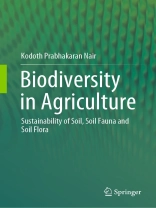This book begins with the principal subject of biodiversity in agriculture. The onslaught of highly soil extractive chemical farming, euphemistically called the “green revolution”, has taken a heavy toll on soil biodiversity, hence, soil sustenance. Agrobiodiversity is a key resource for humanity. All of the food requirements humanity depends on are met by agrobiodiversity. Similarly, fodder fiber, firewood, and many other basic needs of humankind are also met by agrobiodiversity. The book puts forward ideas on how we are to develop a sustainable future, to provide a healthy and thriving environment for humanity by protecting, conserving, and augmenting agrobiodiversity.
The pedosphere, the outermost layer of the Earth, composed of soil and subject to soil formation processes, is an integral component of biosphere, lying on the interface of the atmosphere, hydrosphere, and lithosphere and a lot more complex in its physicochemical and biological characteristics and functioning andquite distinguishable from that of the above soil-surface terrestrial and aquatic ecosystems. The biotic component of the pedosphere comprises a rich biodiversity of living species, dominated by microorganisms. This book considers and discusses the influences of soil formation processes.
This book will be of interest to those engaged in researching biodiversity, agriculture, and crop science.
Table of Content
Chapter 1: Introduction.- Chapter 2: Agrobiodiversity.- Chapter 3: Biodiversity of the Pedosphere.- Chapter 4: Chemosynthesis-based community biodiversity.- Chapter 5: What are the threats to biodiversity? Its conservation and sustainability.












